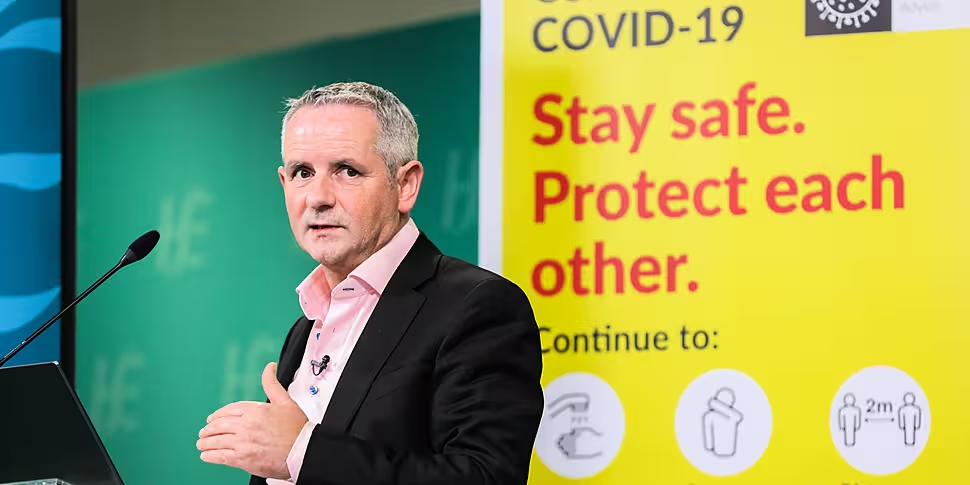The COVID-19 situation in Irish hospitals is now "quite stark", the head of the HSE has said.
Paul Reid said vaccines have made a significant difference in limiting serious illness, but the hospital system is still facing a "high level of stress and duress".
As of this morning, the number of patients with COVID-19 in Irish hospitals has risen to 617 - the first time the number has reached 600 since February.
More than 100 of those hospitalised patients are being treated in intensive care.
Daily case numbers have remained very high, with more than 8,000 new cases being reported over the weekend alone.
On The Pat Kenny Show, HSE CEO Paul Reid said around 71 of those in ICU are receiving ventilation.
However, many of those being treated outside ICU are receiving "enhanced supports" in high-dependency units or on wards.
Mr Reid explained: “Those supports include non-invasive ventilation. That might sound not too bad… but it’s a highly uncomfortable mask strapped quite tightly to a face.
“We are at a really critical level, with well over a third of our ICU beds utilised for COVID positive patients.
"It’s quite a high level of sickness, and quite a high level of stress and duress on our hospital system."
The HSE boss said around 57% of people in ICU are not fully vaccinated - the vast majority of whom have had no vaccine at all.
He said the hospitals are also "coping with a lot more" than last winter, as other non-COVID care is also happening.
He said: "Thankfully, the boosters and vaccines have made a difference… we would no doubt be at a higher critical number [otherwise].
"But there is already non-COVID and elective care we’ve had to stop."
Boosters
Earlier, Professor Sam McConkey said boosters alone won't be enough to address the current surge in virus cases.
Mr Reid said the reality is there's not one factor alone that can serve as a "silver bullet" to protect society against COVID.
He said: “Vaccinations have hugely helped us - we would be in a much worse situation than we are now. But we know immunity is weakening, particularly in certain populations. That’s why [we have] the booster vaccine programme.
“We do know boosters are working. We do know antigen tests will play a part. But the one thing we know consistently is the good public health measures give us great bang for our buck.”
He said the HSE has been "getting on" with antigen testing in particular settings, despite "differing views" among health officials about the use of the rapid tests.
He said: “We provide regular and updated information on the best use of them… we use them where we’re recommended by public health in the testing and tracing process… and thirdly we work with sectors, such as the agriculture sector in meat plants."
An open tender, meanwhile, has been put out to help secure any additional supplies of the rapid tests that are needed as they start being used more widely across society.
Ministers are meeting today and tomorrow to discuss whether more measures are needed to combat the current surge in COVID-19 cases.
They'll consider NPHET's advice around a return to a full work-from-home policy and the wider use of digital COVID certs.
Mr Reid said the HSE has “always welcomed” the process of rebuilding back towards a normal society.
He said they've seen the impact lockdowns and restrictions have had on physical health, mental health and wellbeing.
However, he added: “What this virus does is it catches you at the pass.... and it’s done it again.
"Then other considerations have to be made - but they’re all policy decisions for government.”









